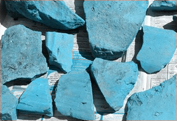Road to Roman Wigan Exposed
|
|
The Roman road from Lancaster to Wigan has been uncovered just south of Preston by the
Lancaster University Archaeology Unit. This important west coast main route, which
went on to connect Wigan with Warrington and Chester, was discovered in excavations
carried out in advance of new development on a site adjacent to the Warner Brothers Cinema
at Walton-le-Dale. A few weeks ago I had the opportunity to visit the site with a
group of society members and I would like to apologise to all those who I could not
contact in time for the trip.
Roman Kiln
A rare find in the excavations, which were started late last year, was a Roman pottery
kiln, complete with a pile of broken reject pots and roof tiles. Ian Rogers of the
L.U.A.U., who gave us a guided tour of the site, explained that samples from the kiln had
been dated using ‘Residual Magnetism’ to around 280 AD. There were also a
number of stone lined wells, one of which had been fully excavated to a depth of 4 metres.
Settlement
The earliest phase of the settlement dates to the 1st century AD and is
represented by the remains of very large prefabricated timber buildings. Later,
these were replaced by smaller units in which a variety of crafts were carried out
including leather tanning and metal working. Evidence for occupation of the site
after the 3rd century does not exist, although it could be that later ploughing has
destroyed this phase. Alternatively the settlement may have transferred to the
higher ground of Walton itself to avoid flooding. (Walton comes from Wallas or Walsh Ton
which is Saxon for ‘British’ settlement).
Road in Section
Although there was a considerable amount of pottery and other finds such as glass, the
highlight of the excavation for me was the Roman road. This had been sectioned,
revealing an elaborate construction, i.e. a clay cambered based with layer upon layer of
pebbles and rammed gravel surfaces indicating a number of repair stages.
By the time you receive this newsletter the excavators will have finished their work
and the developers will have moved in to bury the site once and for all under a car park
or new buildings.
Ancient
I have recently received a copy of a bimonthly magazine entitled
‘Ancient’. Apparently it has been going for ten years but I have never
heard of it before. This edition contains articles on Cairo Museum, Greek coins and
the Roman army. It seems very good, so on behalf of the society I have sent off the
yearly subscription (£10). This brings the number of periodicals the society is
contributing to, to four, i.e. Current Archaeology, the Council of Independent
Archaeologists, Lancashire County History and Ancient. If anybody wants to borrow
any, please see me at the meetings.
Crews
Campaign for the Restoration of the Wells of Standish. At the March meeting I mentioned
a letter I had received from CREWS outlining their efforts to mark the site of Hic Bibi
Well. This ancient and locally celebrated well on the Standish-Coppull border was
destroyed by sand quarrying, though the spring of water seems to have surfaced again
nearby. They have obtained the land-owners permission and intend erecting a simple
stone inscribed HIC BIBI some time in the Summer. I have therefore sent them a small
contribution (£10) towards the cost of the project. Mr Hilton, secretary of CREWS,
tells me that work is already in hand for the reconstruction of the well in Market Street,
Standish that was destroyed in the last war when an American lorry fell in it.
Next Meeting
The next meeting of the Society will be on Wednesday 7th May at the history shop at
7.30 pm as usual. This month’s speaker is Rachael Newman, who will be talking on the
Romans in Lancashire. Rachael was in charge of excavations at the Walton-le-Dale
site and will be able to explain the findings in more detail.
Hope to see you at the meeting - B.A.
|



